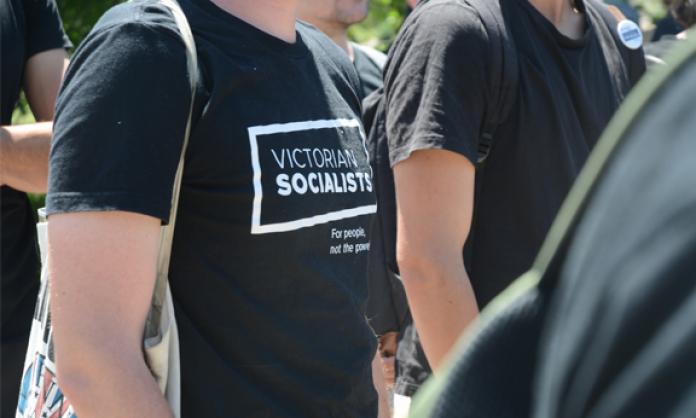“Jeez, you’re up early!” Perhaps he could tell I’ve never been much of a morning person, despite two decades of early starts in construction.
Or perhaps candidates for parliament rarely get to Craigieburn station to leaflet passengers scrambling onto the 5:43am to the city. This train lands you at Flinders Street station at 6:27, just time enough to grab a coffee and get to work for a 7am start. Construction workers and women of colour, in the blue collars of hospital orderlies or catering staff, rush past and grab a leaflet.
For the first time in my political life, I’m on the campaign trail. Apart from letterboxing for Gough Whitlam as a 9-year-old in 1975, and a couple of stints on polling day here and there, this is the most I’ve had to do with an electoral campaign.
And, much to my surprise, I’m loving it.
Turning up and paying attention has to be one of the most basic rules of political activity. And campaigning in a state election, with a winnable political project, is the perfect project for exactly that.
At Craigieburn station, there’s a bit of recognition for the flyers with a picture of Steve Jolly, the Victorian Socialists’ lead candidate for Northern Metro upper house seat. “Yeah, I think I know him.” One construction worker slows down – “He’s that guy who spoke at CUB a couple of years back?”
Perhaps this worker has a photographic memory. Or perhaps the 8,000 leaflets we handed out at the massive union rally last week has helped the recognition of Steve’s support, as a local councillor, for this crucial industrial dispute. “Irish, yeah? I might have had him as a shop steward”, he continues – so maybe a bit of both.
A woman, one of the few not in a mad rush, stops to chat when I give her a leaflet with my more or less standard opening line: “Victorian Socialists for the state election – we think the big corporates have been partying pretty hard at our expense – they’ve got the big parties in their back pocket. This guy’s a decent fighter who’ll give them a bit of a nudge”.
“Well, they need more than just ‘a bit of nudge’!”, she smiles.
I stumble over, agreeing: “Yeah, it’s not like one decent fighter in the parliament is going to change everything –” until she butts in, mock sarcastic: “Well really! Is that right?!”
Try telling the working class in Melbourne’s northern suburbs, or most other places, for that matter, that the system is rigged, and you might get a snort of recognition – perhaps mixed with resignation, or contempt for the idea it can ever be any different. But you also get some points for stating an obvious truth that none of the main political players dare to mention.
I explain to the friendly-sarcastic woman that I met Steve literally half my lifetime ago, in 1992, on a picket line to save Richmond Secondary College from being shut down by Liberal premier Jeff Kennett. And that, though I’ve butted heads with him over the years, he gets credit for keeping up that sort of agitation ever since, especially through his council position in Yarra – a model we now want to spread through the northern suburbs. It’s not just a grab bag of pro-working-class policies, but a more hands-on, trouble-making, agitational way of doing politics, that we’re trying to popularise.
“OK that’s good. And this looks really good.” She’s serious now, looking at the leaflet, moving on towards the station. “I’ll definitely consider it.”
The dull compulsion of economic facts, whipping the morning commuters onto the 5:43, means that there’s little chance for long chats while campaigning at a station.
You can have a campaign stall in the street, but that tends to self-select only the most interested. These are crucial people for any political project, but for a new electoral party to have any chance, we need to explain what we’re on about to people who would usually walk past anyone talking about politics.
This is why we spend time knocking on people’s doors.
As a way to meet the infinite varieties of the working class – and everyone else – in the northern suburbs, doorknocking is the best. You get to turn up and pay attention 20 or 30 times an hour.
I hand a flyer to an old man on his Northcote doorstep: “Steve’s not your average politician. He’s a construction worker, a staunch unionist –”
The man cuts me off: “You got me!” He’s simultaneously opening the leaflet, closing the door, and talking over me. “Thirty years on the docks, mate. You got me – no, you don’t need to explain any more mate – this is it – good on you mate – you got me.”
I learn to ignore the “do not knock” stickers designed to deter door to door salespeople. One of my best conversations is with a woman in East Preston with three such stickers – one from her local Labor MP. She props open the security door with her walking frame and settles in for a chat.
A mention of Richmond Secondary brings a spark – her daughter was at the local Northlands Secondary until it was shut by Kennett: “And then the Aborigines saved the school!”, she tells me, shorthand for the campaign of the local Aboriginal community, including prominent activist Gary Foley, which meant that Northlands, along with Richmond, was one of the few school sites not shut down and sold off.
She’s too stuck at home to help with much campaigning, but takes extra leaflets for her upcoming bingo night. “I’ll see if I can get them to ask Steve along to speak.”
Chickens in the front yard, and a Lidia Thorpe corflute in Thornbury. The new Greens member for Northcote, the first Indigenous woman elected to the Victorian parliament, is obviously popular around here. My doorknocking partner is reluctant to approach a Greens voter, so I navigate my way past the chooks to the front door. “I can see you’re voting for Lidia in the lower house. I’m here to try convince you to vote for Steve in the upper house.”
“OK. Well, tell me what he’s done.”
Which I proceed to do. Starting with Richmond Secondary, and finishing with Steve’s campaigning, on and off the Yarra council, that has forced the developers of the former Gas and Fuel site in Clifton Hill to include open space, community facilities and 20 percent low cost accommodation. We could have solved the homelessness crisis with a couple of years of that approach, across the city.
“OK, Lidia in the lower house, Steve in the upper house.” I steer back past the chooks and on to the next house.
Sandals outside the front door of a Broadmeadows unit, and a phrase in what might be Urdu script on the door. A young man from Pakistan answers my knock, immaculate in his Sunday South Asian attire. It’s his second state election since becoming a citizen. “Last time I voted ASP”, he announces. My incomprehension prompts him to spell it out: “Australian Sex Party”. He bursts out laughing at my double take. He’s a protest voter looking for a new approach. He’ll seriously consider us.
One street over a guy comes out of his house. “Fucking 457 visas stealing our jobs” is his answer to my question about issues that get him going. “I think anyone should be able to come here”, I respond, “just they shouldn’t be forced on to these shit visas that mean they can be sacked and deported if the speak up”. I have to say the same thing twice, but he gets it.
He’s an electrician who has worked on plenty of resource projects: “What happened to one rate for the job?”, he asks. “Back when we had the union, you got a good rate and all the trimmings – now it’s someone on $40 an hour flat rate undercutting someone on $50.” We end up in a long chat on the evils of enterprise bargaining and Labor’s role in writing our shit industrial rules. Like most (though not all) the racism I encounter on people’s doorsteps, an initial recital of a right wing talking points gets dropped when contradicted with a straightforward class analysis. After all, it’s not migrants who shut the massive Ford factory in the middle of the electorate, or who have poisoned the community with toxic smoke from industrial fires in recent years.
There’s plenty of hard slog. Occasionally, I find a person who seems to have been waiting for me to knock on their door so they can have a high-volume, no-holds-barred yell about the corruption of the political system. Fair enough.
How all of this translates on election day, I genuinely have no idea.
Dodgy preference deals with right wing parties, which gave Fiona Patten the seat last time for the Sex Party, might well mean that all our efforts result in a decent vote but not an electoral win. So maximising Steve Jolly’s upper house vote is the big objective.
Having lower house candidates maximises a party’s upper house vote, apparently. I have to explain this to various people while trying to convince them, with varying degrees of success, to become Victorian Socialists candidates in lower house seats we have no chance of winning this time around.
I explain this to a friend of mine, one of the leading union delegates at Woolworths’ Hume distribution centre, who has just taken redundancy as the company throws 700 workers on the scrapheap and shuts the centre. He supports the Victorian Socialists project and is great on a doorknock – but after years as a union delegate, he doesn’t want his name up in lights while he thinks about a future career.
Which means, first, that we’re short of a candidate in Broadmeadows. And second, having twisted various people’s arms to stand, I’m in no position to say no when they twist mine back and ask me to be candidate.
I’ve never lived in the electorate.
Then again, I’ve never lived in Brighton either, where sitting Labor member Frank McGuire apparently lives (nor in Toorak, home to Frank’s millionaire TV personality brother Eddie). And I bet I’ve been on more union picket lines and anti-racist protests in Broadmeadows than Frank McGuire ever has.
One of the safest Labor seats in the state, Broadmeadows has the highest proportion of labourers, the lowest proportion of managers and the highest proportion of Muslims in Victoria. It’s a place where the organised left has little to no presence, and a place we’ll want to build one at some point.
So I’m the candidate. Turning up, paying attention, and advocating for a socialist approach to working class politics, often at the rate of one door at a time.
So far, we’ve knocked on almost a third of the doors in the electorate.
Hopefully, if we can get those few extra votes to swing Steve Jolly’s way in the upper house, we’ll be celebrating a breakthrough for socialist politics on 24 November.









